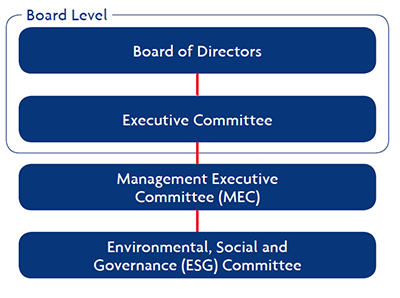Board Statement on Sustainability
The Board is committed to building on the Bank’s rich heritage to continue creating long-term value for all its stakeholders. Integral to the business direction UOB takes is its sustainability strategy. In formulating this strategy, the Board considered the factors which contribute to the sustainable growth of the Bank. As part of the process, the Bank undertakes an annual exercise to gather and to assess data and insights from across the organisation and from its external stakeholders.
Together with Management, the Board identified opportunities relevant to the long-term success of the Bank and determined the material ESG risks to be managed. Through its Committees, the Board oversees the management and monitoring of these factors to ensure that the Bank is responding effectively to developments in the market and in view of its stakeholders’ expectations. The Board and Management are supported in this regard by the Bank’s dedicated ESG Committee comprising senior executives from functions across the organisation.
The framework of UOB’s sustainability reporting is in line with the Singapore Exchange (SGX) Sustainability Reporting Guide and the Global Reporting Initiative (GRI) Standards. We are pleased to state that for its disclosure on material topics in its Annual Report 2017, UOB received Special Recognition for Stakeholder Engagement and Materiality at the Singapore Sustainable Business Awards 2018. The report was also a finalist for Asia's Best Sustainability Report within an Annual Report at the Asia Sustainability Reporting Awards 2018.
The Bank’s values of Honour, Enterprise, Unity and Commitment underpin UOB’s sustainability strategy. These will continue to guide its people, policies and processes to ensure the long-term interests of its stakeholders are met and the performance of UOB sustained.


